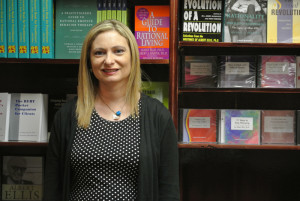by Deniz Sidali, M.A.
A few years ago, a popular show I use to watch on television Six Feet Under ended. The show was about different ways people ended up dying and how this tragedy was interwoven into the lives of a family of morticians overseeing their funerals. The storylines really made viewers wonder how they would eventually die. If I had my druthers, I would probably want to die after consuming a huge amount of chocolate as popularized in the song by Sia. But, I don’t think this is likely to happen. As a therapist having treated people with anxiety-based disorders, I can surely say that I have encountered many people who fear death. And this overwhelming fear of death is what lies as the core belief behind their debilitating anxiety and phobias. But, I often wonder, is it fear of death or fear of suffering that causes their anxiety? Well, I personally don’t fear death or dying. I completely understand our time is limited here on this earth, that time stands still for no man or woman, that tomorrow is not promised to us, and that we must live life to the fullest as though it were our last. But, I would worry about how my family would feel after I was dead. And, most of all, personally I would fear suffering. And I think this is what truly lies at the basis of many people’s fears.
This fear of suffering is probably why I would choose to die by eating chocolate. If I am going to go out, I might as well enjoy myself. At any rate, there are people who suffer from OCD, phobias, and other types of unhealthy anxiety, causing them to severely restrict their quality of life. People with anxiety may refuse to leave their homes, meet people, avoid flying on planes, riding trains, or merely touching a doorknob out of their intense fears. By avoiding a multitude of aspects of their daily lives, people experiencing unhealthy anxiety are constantly reminding themselves that their time is limited on this earth. And during the process, they are ironically causing themselves to suffer day in and day out. This stress in and of itself may curtail years off a person’s life. Some clients have often asked, “Well what if I were dead?” To which I would reply, “So, what if you were dead? You wouldn’t feel or think anything because you would be dead?” Too many peoples surprise, they may reply, “Yeah, I never thought of it like that”. So this line of reasoning led me to believe that maybe, people fear suffering or fear of the unknown. Well, if you fear the unknown, you can simply tell yourself, “The only thing that I can be certain of is that there is no certainty in this life or the next”.
By confronting your fears or anxiety, you may actually feel more alive than dead. For instance, I fear going on roller coasters because I have no control over when there will be twists and turns. But once I am able to endure the roller coaster ride, I actually feel more alive and exhilarated. But, I first need to commit myself to taking the plunge and going on the ride in order to create this experience. The goal is not to eliminate healthy concern which is necessary for our survival. The goal is to challenge our irrational beliefs which cause us to feel elevated levels of unhealthy anxiety which is counterproductive to our survival because we are overusing this alarm system and distorting our perception of reality. We could entertain the elegant solution by asking ourselves, “What would be the worst thing that could possibly happen if we were to die?” Well, if you don’t know the answer to this question, then how could you be so anxious and fearful of something that is unknown or intangible?
The concept of death, although unpleasant, varies based on the meaning you ascribe to it. In the Mexican culture, people celebrate and remember their deceased loved ones annually and have festivals. In Jewish culture, mourners sit shiva and talk about all the positive attributes of their departed loved ones. And in India, people can dine at a restaurant built atop a cemetery. So why is death not as aversive in these cultures? The bottom line is, we ascribe meaning to concepts of life and death and these situations are deemed joyous or anxiety/fear provoking through our positive or negative thoughts. So maybe we should celebrate both life and death.

